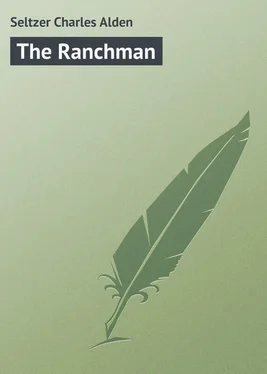Charles Seltzer - The Ranchman
Здесь есть возможность читать онлайн «Charles Seltzer - The Ranchman» — ознакомительный отрывок электронной книги совершенно бесплатно, а после прочтения отрывка купить полную версию. В некоторых случаях можно слушать аудио, скачать через торрент в формате fb2 и присутствует краткое содержание. Жанр: foreign_prose, на английском языке. Описание произведения, (предисловие) а так же отзывы посетителей доступны на портале библиотеки ЛибКат.
- Название:The Ranchman
- Автор:
- Жанр:
- Год:неизвестен
- ISBN:нет данных
- Рейтинг книги:3 / 5. Голосов: 1
-
Избранное:Добавить в избранное
- Отзывы:
-
Ваша оценка:
- 60
- 1
- 2
- 3
- 4
- 5
The Ranchman: краткое содержание, описание и аннотация
Предлагаем к чтению аннотацию, описание, краткое содержание или предисловие (зависит от того, что написал сам автор книги «The Ranchman»). Если вы не нашли необходимую информацию о книге — напишите в комментариях, мы постараемся отыскать её.
The Ranchman — читать онлайн ознакомительный отрывок
Ниже представлен текст книги, разбитый по страницам. Система сохранения места последней прочитанной страницы, позволяет с удобством читать онлайн бесплатно книгу «The Ranchman», без необходимости каждый раз заново искать на чём Вы остановились. Поставьте закладку, и сможете в любой момент перейти на страницу, на которой закончили чтение.
Интервал:
Закладка:
He had shown himself capable, self-reliant, confident. She would have given him her entire admiration had it not been for the knowledge that she had caught him eavesdropping. That action had almost damned him in her estimation – it would have completely and irrevocably condemned him had it not been for her recollection of the stern, almost savage interest she had seen in his eyes while he had been listening to Carrington and Parsons.
She knew because of that expression that Carrington and Parsons had been discussing something in which he took a personal interest. She had not said so much to Carrington, but her instinct told her, warned her, gave her a presentiment of impending trouble. That was what she had meant when she had told Carrington she had seen fighting in Taylor’s eyes.
Taylor confined himself to the smoking-compartment. The negro porter, with pleasing memories of generous tips and a grimmer memory to exact his worship, hung around him, eager to serve him, and to engage him in conversation; once he grinningly mentioned the incident of the cast-off clothing of the night before.
“I ain’t mentionin’ it, boss – not at all! I ain’t givin’ you them duds till you ast for them. You done took me by s’prise, boss – you shuah did. I might’ near caved when you shoved that gun under ma nose – I shuah did, boss. I don’t want to have nothin’ to do with your gun, boss – I shuah don’t. She’d go ‘pop,’ an’ I wouldn’t be heah no more!
“I didn’t reco’nize you in them heathen clo’s you had on yesterday, boss; but I minds you with them duds on. I knows you; you’re ‘Squint’ Taylor, of Dawes. I’ve seen you on that big black hoss of yourn, a prancin’ an’ a prancin’ through town – more’n once I’ve seen you. But I didn’t know you in them heathen clo’s yesterday, boss – ’deed I didn’t!”
Later the porter slipped into the compartment. For a minute or two he fussed around the room, setting things to order, meanwhile chuckling to himself. Occasionally he would cease his activities long enough to slap a knee with the palm of a hand, with which movement he would seem to be convulsed with merriment, and then he would resume work, chuckling audibly.
For a time Taylor took no notice of his antics, but they assailed his consciousness presently, and finally he asked:
“What’s eating you, George?”
The query was evidently just what “George” had been waiting for. For now he turned and looked at Taylor, his face solemn, but a white gleam of mirth in his eyes belying the solemnity.
“Tips is comin’ easy for George this mornin’,” he said; “they shuah is. No trouble at all. If a man wants to get tips all he has to be is a dictionary – he, he, he!”
“So you’re a dictionary, eh? Well, explain the meaning of this.” And he tossed a silver dollar to the other.
The dollar in hand, George tilted his head sidewise at Taylor.
“How on earth you know I got somethin’ to tell you?”
“How do I know I’ve got two hands?”
“By lookin’ at them, boss.”
“Well, that’s how I know you’ve got something to tell me – by looking at you.”
The porter chuckled. “I reckon it’s worth a dollar to have a young lady interested in you,” he told himself in a confidential voice, without looking at Taylor; “yassir, it’s sure worth a dollar.” He slapped his knee delightedly. “That young lady a heap interested in you, ’pears like. While ago she pens me in a corner of the platform. ‘Porter, who’s that man in the smoking-compartment – that cowboy? What’s his name, an’ where does he live?’ I hesitates, ’cause I didn’t want to betray no secrets – an’ scratch my haid. Then she pop half a dollar in my hand, an’ I tole her you are Squint Taylor, an’ that you own the Arrow ranch, not far from Dawes. An’ she thank me an’ go away, grinnin’.”
“And the young lady, George; do you know her name?”
“Them men she’s travelin’ with calls her Marion, boss.”
He peered intently at Taylor for signs of interest. He saw no such signs, and after a while, noting that Taylor seemed preoccupied, and was evidently no longer aware of his presence, he slipped out noiselessly.
At nine thirty, Taylor, looking out of the car window, noted that the country was growing familiar. Fifteen minutes later the porter stuck his head in between the curtains, saw that Taylor was still absorbed, and withdrew. At nine fifty-five the porter entered the compartment.
“We’ll be in Dawes in five minutes, boss,” he said. “I’ve toted your baggage to the door.”
The porter withdrew, and a little later Taylor got up and went out into the aisle. At the far end of the car, near the door, he saw Marion Harlan, Parsons, and Carrington.
He did not want to meet them again after what had occurred in the diner, and he cast a glance toward the door behind him, hoping that the porter had carried his baggage to that end of the car. But the platform was empty – his suitcase was at the other end.
He slipped into a seat on the side of the train that would presently disclose to him a view of Dawes’s depot, and of Dawes itself, leaned an elbow on the window-sill, and waited. Apparently the three persons at the other end of the car paid no attention to him, but glancing sidelong once he saw the girl throw an interested glance at him.
And then the air-brakes hissed; he felt the train slowing down, and he got up and walked slowly toward the girl and her companions. At about the same instant she and the others began to move toward the door; so that when the train came to a stop they were on the car platform by the time Taylor reached the door. And by the time he stepped out upon the car platform the girl and her friends were on the station platform, their baggage piled at their feet.
Dawes’s depot was merely a roofless platform; and there was no shelter from the glaring white sun that flooded it. The change from the subdued light of the coach to the shimmering, blinding glare of the sun on the wooden planks of the platform affected Taylor’s eyes, and he was forced to look downward as he alighted. And then, not looking up, he went to the baggage-car and pulled his two prisoners out.
Looking up as he walked down the platform with the two men, he saw a transformed Dawes.
The little, frame station building had been a red, dingy blot beside the glistening rails that paralleled the town. It was now gaily draped with bunting – red, white, and blue – which he recognized as having been used on the occasion of the town’s anniversary celebration.
A big American flag topped the ridge of the station; other flags projected from various angles of the frame.
Most of the town’s other buildings were replicas of the station in the matter of decorations – festoons of bunting ran here and there from building to building; broad bands of it were stretched across the fronts of other buildings; gay loops of it crossed the street, suspended to form triumphal arches; flags, wreaths of laurel, Japanese lanterns, and other paraphernalia of the decorator’s art were everywhere.
Down the street near the Castle Hotel, Taylor saw transparencies, but he could not make out the words on them.
He grinned, for certainly the victor of yesterday’s election was outdoing himself.
He looked into the face of a man who stood near him on the platform – who answered his grin.
“Our new mayor is celebrating in style, eh?” he said.
“Right!” declared the man.
He was about to ask the man which candidate had been victorious – though he was certain it was Neil Norton – when he saw Marion Harlan, standing a little distance from him, smiling at him.
It was a broad, impersonal smile, such as one citizen of a town might exchange with another when both are confronted with the visible evidences of political victory; and Taylor responded to it with one equally impersonal. Whereat the girl’s smile faded, and her gaze, still upon Taylor, became speculative. Its quality told Taylor that he should not presume upon the smile.
Читать дальшеИнтервал:
Закладка:
Похожие книги на «The Ranchman»
Представляем Вашему вниманию похожие книги на «The Ranchman» списком для выбора. Мы отобрали схожую по названию и смыслу литературу в надежде предоставить читателям больше вариантов отыскать новые, интересные, ещё непрочитанные произведения.
Обсуждение, отзывы о книге «The Ranchman» и просто собственные мнения читателей. Оставьте ваши комментарии, напишите, что Вы думаете о произведении, его смысле или главных героях. Укажите что конкретно понравилось, а что нет, и почему Вы так считаете.












